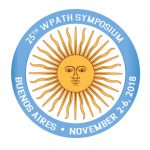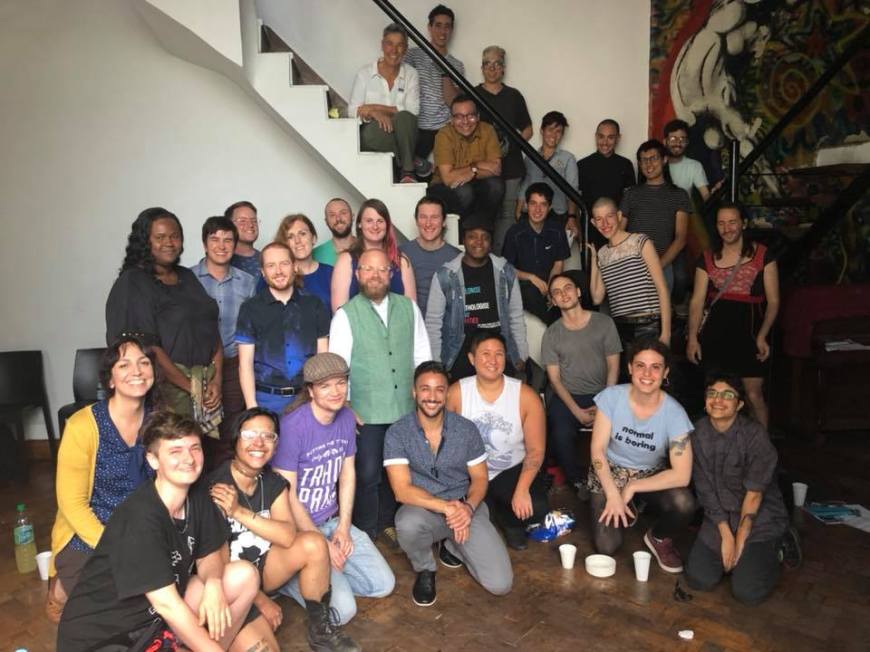This report from written by our own Dr. Ruth Peace and first appears on her blog.

In the first week of November I attended the 2018 WPATH Symposium in Buenos Aires, Argentina. This biennial event is one of the largest trans studies conferences in the world, with around 800 academics, activists, healthcare practitioners and researchers coming together to exchange knowledge.
Most of the conference consisted of parallel sessions: approximately eight or nine speaker panels occurring simultaneously in different parts of the conference venue. So it is impossible for anyone to take part in the majority of conference events. Nevertheless, I attended as many sessions as possible, and livetweeted from most of these. Links to Twitter summaries of the sessions I attended can be found at the end of this post.
In this post, I comment primarily on my observations of the conference as a sociologist and trans professional.
Opportunities and inclusion
As I anticipated, WPATH 2018 was full of contradictions.
On the one hand, it was exciting to join and learn from so many academics, healthcare practitioners and human rights experts working in the field of trans health. As I report in the Twitter summaries below, the conference provided a great opportunity to participate in debates over new ideas and standards of care, and hear about cutting-edge research findings and advances in clinical practice. It was an especial privilege to learn first-hand about the implementation and impact of Argentina’s pioneering Gender Identity Law, a topic I expand upon later in this post, but hope to write about in more detail in the near future.
I was also glad to have the opportunity to present a paper on research ethics and a poster with initial findings from the Trans Pregnancy project to an international audience.
It was excellent to see that the conference organisers acknowledged and responded to some of the feedback from trans delegates in previous years. Gender-neutral toilet blocks were present on every floor of the conference venue, and pronoun stickers were provided to accompany name badges. The provision of a “trans hospitality suite” enabled trans attendees to relax in a more comfortable environment, and also arrange our own ad-hoc meetings and events. This was inevitably re-branded by its users as an “intersex and trans” room in recognition of the importance of this space also to intersex delegates; I hope conference organisers will learn from this for future events.
This year’s Symposium also benefited from a clear code of conduct and language guide, previously introduced for the 2017 USPATH and EPATH conferences.
Microaggressions and objectification
On the other hand, the cis-centric atmosphere of the event felt like a slow, painful, constant grind. As with previous WPATH conferences, the event was punctuated by constant microaggressions (and, on occasion, outright “macro”aggression); these were damaging to intersex people, people of colour and delegates from the Global South as well as trans attendees. Examples include individuals advocating for intersex genital mutilation, off-colour jokes about trans suicide, the use of outdated language, and misgendering of research participants.
Some research seemed entirely voyeuristic: for example, one poster from the Netherlands purported to report on differing levels of jealousy towards sexual competitors among “mtof and ftom transgenders”. It was often unclear how consent was obtained (if at all) for the use of personal information about research participants and/or patients. This was particularly concerning when numerous posters and powerpoint slides included unnecessary photographs of intersex and/or trans genitalia (a “WPATH conference bingo” grid circulated among intersex and trans attendees of the event included a square for “unexpected genitals”).
As a trans attendee, I felt deeply objectified by the tone and content of this material. It felt dehumanising, and I felt like a thing, subject to the harsh gaze of an abstract, dehumanising curiosity. Yet I was disturbed not only by those engaging in such work, but also in the response of many of their peers. Numerous practitioners and researchers who seemed broadly sympathetic to trans rights and affirmative in their own work often said nothing to counter transphobia, cisgenderism and endosexism in the work of others. It is difficult for intersex and trans people to explain how painful this situation is when most of our colleagues and the senior figures in the field are not intersex or trans; we know that our projects and careers alike may suffer if we speak out too openly or too harshly. I encourage fellow members of WPATH to reflect on their potential complicity in this situation, and consider how we might collectively work to change it.
Tokenism and colonialism
The choice to locate the conference in Buenos Aires felt deeply tokenistic, with numerous attendees from the Global South arguing that this represented a colonial attitude. The vast majority of conference attendees were from the United States or Western Europe. The price of the conference was a significant barrier to many attendees, amounting to the equivalent of the average monthly income in Buenos Aires. The choice to host the event in an expensive Hilton hotel felt like it was taken primarily for the benefit of (the more wealthy) attendees from the West to the detriment of local intersex and trans people, some of whom reported that they risked being profiled by the police if they tried to enter the wealthy area of the city in which the hotel was located.
The sessions on clinical practice in Argentina and human rights in Latin American were some of the most interesting I sat in on, but also least well-attended. I later heard that on one occasion a high-profile lawyer invited to speak on the topic of Argentina’s Gender Identity Law addressed a near-empty room, due to clashes with sessions that focused on Western bioethics, research and medical practice. This sense of tokenism was compounded through the choice to hold the conference in English (the official language of WPATH), with funded translation into Spanish available in a maximum of two rooms at any one time. Some of the conference organisers later stated that they had been worried about the finances of the event, but this felt like a strange claim in the wake of a lavish gala dinner with dancers, DJs, and multiple buffets serving food from various regions of Argentina. As human rights expert and executive director of GATE Mauro Cabral declared in the closing plenary of the conference, “When WPATH decided to come to Argentina, with the most progressive gender identity law in the world, I was excited. But we could only talk among ourselves. You to this country because of the weather, steak and wine, but not to learn from us”.
While these issues are primarily structural ones that need to be formally addressed by WPATH, the onus is also upon individuals from Western and/or Anglophone countries to take action and reflect upon our relative power and privilege in attending these events. In addition to vocally supporting my colleagues from the Global South, one aspect of my own practice I feel I can address is my use of language in planning talks. For example, I could have undertaken a little extra work to ensure that my slides were bilingual, listing bullet points in Spanish as well as in English. I hope to draw on this lesson in preparing for future international events.
TPATH, human rights monitors, and lessons from Argentina
My experience of WPATH 2018 was improved enormously by the presence of other trans people working in the field of trans health, as well as the intersex activists and human rights experts who came to monitor WPATH’s historic antipathy towards intersex rights. Many of us are members of TPATH (the Transgender Professional Association for Transgender Health), a new and as-yet loosely affiliated group of trans people working in trans health that I helped to co-found during the 2016 WPATH Symposium in Amsterdam. Numerous others were part of a 50-strong delegation of intersex and trans human rights monitors from all parts of the world, who attended in order to conduct a collective human rights audit of the conference.
It was with these individuals that I found myself having the deepest conversations, these individuals with whom I heard the most fascinating research findings and the most rigorous analyses. We also shared a strong sense of solidarity in the face of the many problems apparent at WPATH 2018.
That said, the most important event I attended took place outside of the WPATH event: in Casa Jáuregui, a historic queer cultural centre many blocks away from the Hilton. Here, Frente de Trans Masculinidades (the Transmasculine Front) and other activists based in Buenos Aires from hosted a meeting with TPATH members from the Bahamas, New Zealand, Norway, South Africa, the UK and the USA. We shared information on our various areas of work, and the local activists talked at length about the history, implementation and practical impact of the Gender Recognition Law.

Argentinian activists host TPATH members at Casa Jáuregui.
While it is important not to deny the significant challenges faced by trans people in Argentina, which include harassment by authorities, economic marginalisation and many forms of violence and discrimination, many of us were struck by how much has been achieved by activists in Argentina and (consequently) how advanced trans rights are in this country. The Gender Identity Law has been carefully written to enable flexibility; this has meant, for example, that it was interpreted to enable non-binary recognition by a judge as recently as last week. It also guarantees access to healthcare, which has meant that every possible medical intervention is available to trans people, either for free or through relatively inexpensive health insurance (in theory, that is: in practice, various legal battles have been necessary). This has been of benefit to cis women and queer people as well as trans people: for instance, through enabling easier access to hysterectomies or breast reductions.
During the meeting, the local activists described gender-affirming medical interventions that most of us had never even considered, such as beard hair implants for transmasculine individuals who cannot or would prefer not to use testosterone. Moreover, while long waiting lists exist for some procedures such as surgeries, those of us attending from European countries and (especially) Aotearoa/New Zealand were astonished by how much shorter they were than equivalent waiting times in our own countries, in part due to the absence of unnecessary gatekeeping procedures and treatment bottlenecks.
I was profoundly moved by the opportunity to attend this meeting, and regretted that so much of my time in Buenos Aires was spent in the sterile environment of the Hilton. However, I was also glad to have the opportunity to work with others to challenge the hierarchies and cisgenderist assumptions inherent in WPATH. We undertook many small interventions: asking questions about ethics, consent and power dynamics in the sessions we attended, raising concerns in private conversations, reporting blatant contraventions of the WPATH code of conduct. I was also pleased to hear many of my colleagues openly critiquing problematic issues identified during an update on the progress of the forthcoming Version 8 WPATH Standards of Care, and take part in attempts to hold our professional body to account during a member’s meeting on the final day.
Overall, I found WPATH 2018 to be a very tiring, draining and frequently unpleasant experience. However, I do not regret attending. I am grateful to have had the opportunity to learn so much from so many. I am also glad to have played a small role in supporting my intersex and trans colleagues and my colleagues from the Global South in attempting to help transform WPATH so it is more transparent, more accountable, and less colonial in attitude and in action.
Session summaries
The following links are to Twitter threads in which I summarise plenaries, talks and mini-symposia I attended at WPATH 2018.
Saturday 3rd November
Opening session and President’s Plenary
Keynote: Employment discrimination against trans people (Sam Winter)
Keynote: Trans legal history in Latin America (Tamara Adrian)
Sunday 4th November
Oral presentations: Services in different parts of the world (Australia, Southern Africa, Scotland)
Mini-Symposium: Trans refugees: escape into invisibility
Mini-Symposium: Latin American perspectives on depathologization of trans and travesti identities
Plenary: Show hospitality to strangers: intersex issues in the time of gender identity laws (Mauro Cabral and respondents)
Note: this was listed as a plenary session in the programme, but actually took place alongside multiple parallel sessions. Consequently, this talk was under-attended by Western healthcare practitioners in much the same way as the Latin American sessions.
Monday 5th November
Oral presentations: Suicidal and non-suicidal behavior
Mini-Symposium: Ethical considerations in transgender health research
Oral presentations: Reproduction
Tuesday 6th November
Mini-Symposium: Child and adolescent medicine Mini-Symposium: Child and adolescent medicine


Thank you